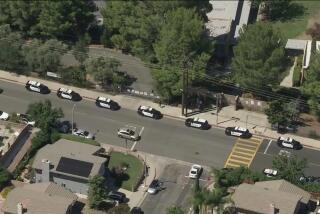Youths Plead for an End to Violence
High school students from Oxnard to Thousand Oaks said Friday they are frustrated with crime on campus and adults’ inability to stop it.
Speaking at Assemblyman Nao Takasugi’s Youth Crime Summit in Thousand Oaks, the students begged a panel of criminal justice officials and politicians for better security, more discipline and clearer communication in the war on increasing campus violence.
“Things come in the mail for our parents, not for us,” said John Freed, 17, a Thousand Oaks High School senior, telling the gathering about the conclusions his study group reached at the conference of about 120 Ventura County high school students. “I don’t know who I’d go to if I wanted to report someone in a gang, except to call 911.”
Others at the session attended by Gov. Pete Wilson’s wife, Gayle, lamented the lack of information available in high schools on crime prevention and self-help programs.
Some students criticized parents for not keeping a tighter grip on their sons and daughters at night, when gang activity increases.
And several teen-agers urged school administrators and teachers to be proactive, not reactive, in handling gang activity, drug use and other campus problems.
After huddling in groups to share problems and ideas, the teen-agers recommended:
* Informing students about anti-crime hot lines, self-help groups and lawmakers they can lobby for better crime-prevention programs.
* Convening an inter-school youth council to keep students abreast of crime and crime-prevention in other schools.
* Increasing security measures such as use of guards and metal detectors.
* Conducting more inter-cultural activities and race-awareness classes to promote understanding and defuse racism that often leads to violence.
* Getting students more involved in sports and after-school activities to divert them from gangs.
“What it comes down to is students taking a more active role in what we do, the administration listening more to the students and the media portraying a more positive view of students,” said Dung Hoang, 16, a junior at Channel Islands High.
The adult panelists agreed that students must be partly responsible for fighting crime in their own schools.
“It’s important that whatever the problem is, people get engaged and involved. I think the students have the solutions to the problems,” said Philip Gore, director of the Gateway Community School, which teaches youths adjudicated by the juvenile court system.
“Students have the greatest impact on school climate, and school climate can only be addressed if students and staff work together,” Gore said.
Ed Ludaescher, youth officer for the Oxnard Police Department, added: “You have a lot more control than you think over your surroundings.”
The officials listened to the students’ suggestions, which ranged from enforcing state curfew laws countywide to putting students through random drug testing.
At the end, Takasugi promised a report in three or four weeks summarizing the summit’s findings and proposing possible solutions that could even become draft legislation.
And Assistant Dist. Atty. Colleen Toy White said she was glad to hear the teen-agers themselves cry for more guidance from parents and teachers.
Students were hopeful about results too.
“I think a lot of good ideas came from it and I think positive things will take place,” said Lauretta Lamothe, 17, a Camarillo High senior. “I think parents definitely need to be more involved and know what their kids are doing.”
But afterward, some students questioned whether the summit would do much to quell on-campus crime.
“Talking about it is different than doing or acting or making a move,” said Josh Tucci, 16, a junior at Frontier High School in Camarillo. “If they’re serious about it, they’ll make a move,”
Kristin Taday, a 17-year-old Thousand Oaks High senior, said she will wait to see whether Takasugi and the panelists act on their goodwill, and she questioned whether students have any power in the adult world.
“If we have control, why would we be here?,” she said. “No one teaches us how to write to our legislators, no one tells us we are capable of making a change. . . . It’s sad to think that the kids are the ones who have to be in charge of this.”
More to Read
Sign up for Essential California
The most important California stories and recommendations in your inbox every morning.
You may occasionally receive promotional content from the Los Angeles Times.










